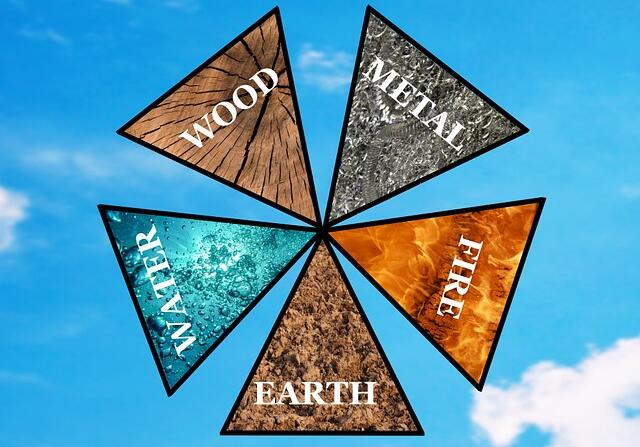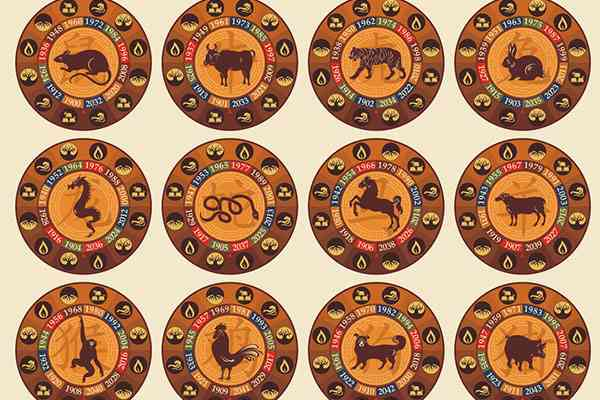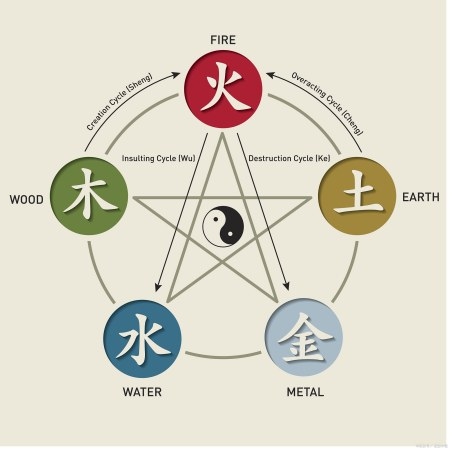The Chinese Zodiac and the Five Elements Theory
The Relationship Between the Chinese Zodiac and the Five Elements Theory
The combination of the Chinese Zodiac and the Five Elements theory is a fundamental philosophical system in traditional Chinese culture. This integration influences various fields such as fate calculation, Feng Shui, and traditional Chinese medicine, reflecting ancient Chinese understanding of the universe, nature, and humanity. Below is a detailed explanation of the relationship between the Chinese Zodiac and the Five Elements theory:
Overview of the Five Elements Theory
The Five Elements theory is an ancient Chinese philosophical concept that categorizes all things in the universe into five basic elements: Wood, Fire, Earth, Metal, and Water. Each element has unique characteristics and interacts with others through generating (mutual production) and controlling (mutual conquest) relationships. The core of the Five Elements theory is understanding the natural changes and how these changes affect human destiny and behavior.
- Wood: Represents growth, development, and expansion, corresponding to spring and the east. Wood is characterized by vitality, flexibility, and strength.
- Fire: Represents passion, energy, and activity, corresponding to summer and the south. Fire is characterized by heat, brightness, and rising energy.
- Earth: Represents stability, balance, and transformation, corresponding to the transitions between seasons and the center. Earth is characterized by neutrality, steadiness, and inclusiveness.
- Metal: Represents firmness, purity, and contraction, corresponding to autumn and the west. Metal is characterized by solidity, sharpness, and contraction.
- Water: Represents wisdom, fluidity, and adaptability, corresponding to winter and the north. Water is characterized by coldness, flow, and nourishment.

The Correspondence Between the Chinese Zodiac and the Five Elements
In traditional Chinese culture, each zodiac sign corresponds to one of the Five Elements. This correspondence influences not only the traits of each zodiac sign but also a person's character, destiny, and life path. Below is the specific correspondence between the Chinese Zodiac and the Five Elements:
-
Rat - Water
- The Rat corresponds to the element of Water. Water is characterized by fluidity, wisdom, and adaptability. People born under the Rat sign are usually considered intelligent, quick-witted, and resourceful, with strong problem-solving skills.
-
Ox - Earth
- The Ox corresponds to the element of Earth. Earth is characterized by stability, endurance, and inclusiveness. People born under the Ox sign are usually seen as hardworking, honest, and reliable, with great perseverance.
-
Tiger - Wood
- The Tiger corresponds to the element of Wood. Wood is characterized by vitality and growth. People born under the Tiger sign are usually considered brave, confident, and energetic, with leadership qualities and a pioneering spirit.
-
Rabbit - Wood
- The Rabbit also corresponds to the element of Wood. The Rabbit's traits are gentleness, sensitivity, and understanding. People born under the Rabbit sign are usually considered kind, gentle, and cautious, with strong interpersonal skills.
-
Dragon - Earth
- The Dragon corresponds to the element of Earth. The Dragon's traits are majesty, mystery, and authority. People born under the Dragon sign are usually considered wise and powerful, with exceptional leadership abilities and foresight.
-
Snake - Fire
- The Snake corresponds to the element of Fire. Fire is characterized by passion, sharpness, and insight. People born under the Snake sign are usually considered mysterious, calm, and intelligent, with strong intuition and insight.
-
Horse - Fire
- The Horse also corresponds to the element of Fire. The Horse's traits are enthusiasm, energy, and freedom. People born under the Horse sign are usually considered energetic, optimistic, and independent.
-
Goat - Earth
- The Goat corresponds to the element of Earth. The Goat's traits are gentleness, balance, and care. People born under the Goat sign are usually considered gentle, empathetic, and focused on harmony in relationships.
-
Monkey - Metal
- The Monkey corresponds to the element of Metal. Metal is characterized by firmness, intelligence, and flexibility. People born under the Monkey sign are usually considered clever, witty, and adaptable, with strong problem-solving abilities.
-
Rooster - Metal
- The Rooster also corresponds to the element of Metal. The Rooster's traits are determination, confidence, and precision. People born under the Rooster sign are usually considered sharp, brave, and decisive, with strong analytical abilities.
-
Dog - Earth
- The Dog corresponds to the element of Earth. The Dog's traits are loyalty, reliability, and protectiveness. People born under the Dog sign are usually considered honest, trustworthy, and responsible.
-
Pig - Water
- The Pig corresponds to the element of Water. The Pig's traits are generosity, kindness, and optimism. People born under the Pig sign are usually considered generous, optimistic, and focused on enjoying life and harmonious relationships.

The Generating and Controlling Relationships Among the Five Elements in the Chinese Zodiac
In traditional Chinese culture, the principles of mutual production and mutual conquest among the Five Elements also apply to the relationships between zodiac signs. Mutual production refers to one element promoting the development of another (e.g., Wood generates Fire, Fire generates Earth). Mutual conquest refers to one element restraining or weakening another (e.g., Water controls Fire, Fire controls Metal).
These generating and controlling relationships also manifest in the interaction and pairing of zodiac signs. For example, Wood-related signs like the Tiger and Rabbit are positively influenced when paired with Fire-related signs like the Snake and Horse. On the other hand, Water-related signs like the Rat and Pig might experience conflict with Fire-related signs, requiring special attention to harmonizing their relationships.
The Five Elements and Fate Prediction
In Chinese fate prediction, the combination of the Chinese Zodiac and the Five Elements is widely used to predict a person's destiny, character, and future development trends. By analyzing a person's birth year, zodiac sign, and corresponding element, one can calculate their fortune in different years. This method of prediction is known as "Ba Zi" or "fate calculation," and it is still widely practiced in China and other East Asian countries.
The Five Elements and Health Maintenance
The Five Elements theory is also applied in traditional Chinese medicine and health maintenance. Different elements correspond to different organs and systems in the human body. For example, Wood corresponds to the liver and gallbladder, Fire corresponds to the heart and small intestine, Earth corresponds to the spleen and stomach, Metal corresponds to the lungs and large intestine, and Water corresponds to the kidneys and bladder. Based on a person's zodiac sign and elemental attributes, traditional Chinese medicine can provide corresponding health advice, helping people balance the energy of the Five Elements in their bodies and maintain physical and mental health.
Cultural Symbolism of the Chinese Zodiac and the Five Elements
In a broader cultural context, the combination of the Chinese Zodiac and the Five Elements theory is not only a tool for fate prediction but also symbolizes the Chinese understanding of nature, social order, and human existence. This system emphasizes the importance of balance, harmony, and alignment with nature, reflecting the traditional Chinese concept of the unity between heaven and humanity.
By understanding the relationship between the Chinese Zodiac and the Five Elements, people can gain deeper insights into their character and destiny, as well as appreciate the rich connotations of ancient Chinese wisdom. This philosophical system continues to play an important role in Chinese society, influencing people's lifestyles, ways of thinking, and views of the world.





